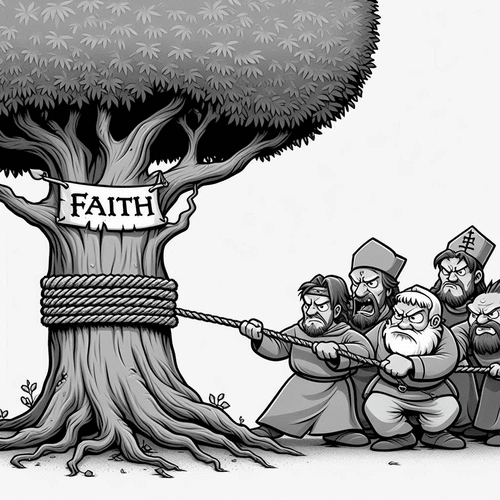The Jesus Seminar Exposed: Distortions of the Real Christ
In 1985, a group of scholars gathered with coloured beads in hand. Their mission? To vote on which words of Jesus recorded in the Gospels were actually spoken by Him. Red beads for authentic sayings, pink for probably authentic, grey for possible but unlikely, and black for words Jesus never said. By the time their work concluded, only 18% of Jesus’ words received the “authentic” red bead.
This was the Jesus Seminar, an academic project that made headlines with its seemingly scientific approach to determining the “historical Jesus.” But beneath the veneer of scholarship lies a fundamental challenge to the Christ revealed in Scripture and confessed by the church for two millennia.
THE JESUS SEMINAR EXPOSED: THE PROBLEM OF METHODS
- Beginning with Doubt, Not Faith: Most traditional Christian approaches to Scripture begin with the assumption the Bible is God’s Word—trustworthy and authoritative. The Jesus Seminar flips the approach on its head, starting with radical scepticism about the Gospels. They don’t just question difficult passages; they question everything unless proven authentic by modern scholarly criteria.
- Arbitrary Dating and Source Theories: The Jesus Seminar places heavy emphasis on hypothetical documents such as “Q” (a theoretical source document) while downplaying the traditional Gospels. They typically date Mark to around 70 AD and the other Gospels significantly later, despite considerable evidence suggesting earlier composition.
- Truth by Committee Vote: Perhaps most troubling is the Seminar’s approach of determining truth by scholarly vote. The coloured bead voting system makes for interesting headlines, but represents a fundamental misunderstanding of how divine revelation works. Truth isn’t determined democratically—it’s revealed by God and recognised by His people.
THE JESUS SEMINAR EXPOSED: HOW IT REINVENTS JESUS
Faulty Presuppositions: The Jesus Seminar’s approach is built on a foundation of naturalism—the philosophical assumption that only natural (not supernatural) explanations are valid. This leads them to automatically reject miracles, divine intervention, and supernatural elements in the Gospels without even examining the evidence.
When Jesus heals the paralytic in Mark 2, He first forgives the man’s sins, then proves His authority by healing him physically. The Seminar’s naturalistic framework forces them to dismiss both the forgiveness and the healing as later additions, despite the coherence and historical attestation of the account. By starting with disbelief in divine inspiration and inerrancy, the Seminar prejudges the very texts they claim to be objectively studying.
Unreliable Criteria for Authenticity: One of the Seminar’s most problematic methods is their heavy reliance on the “criterion of dissimilarity”—accepting as authentic only those sayings of Jesus that differ from both Jewish teachings of His time and early Christian teachings that followed. This creates an artificial Jesus disconnected from His Jewish roots and the very movement He founded.
This criterion forces an impossible standard: anything Jesus said that reflects Jewish thought is dismissed as a later addition from Jewish sources; anything that aligns with early Christian teaching is rejected as the church putting words in Jesus’ mouth. The real Jesus, however, was deeply rooted in Jewish tradition while also speaking words that would naturally form the basis of Christian teaching.
Reducing the Divine Christ to a Wisdom Teacher: The Jesus that emerges from the Seminar’s voting process is not the divine Son of God but merely a wandering sage—a teacher of provocative wisdom sayings similar to other ancient philosophers. Gone are His claims to divinity, His miracles, and His unique relationship with the Father.
Dismissing the Resurrection as Metaphor: The Seminar famously rejected the bodily resurrection of Jesus, considering it a later development rather than a historical event. Without the resurrection, Christianity becomes merely another philosophy among many, not the world-changing proclamation of God’s victory over sin and death.
Undermining the Atonement: By dismissing large portions of Jesus’ teachings and the passion narratives, the Seminar effectively undermines the doctrine of atonement—that Christ died for our sins.
In the Seminar’s reconstruction, Jesus didn’t come primarily to die for sins but to offer provocative teachings. This view stands in stark contrast to Jesus’ own words: “the Son of Man did not come to be served, but to serve, and to give his life as a ransom for many” (Mark 10:45).
ULTIMATE AUTHORITY: SCRIPTURE OR MODERN SCHOLARSHIP?
- Ignoring the Sufficiency of Scripture: The Jesus Seminar represents a fundamental shift in authority—from Scripture to scholarly consensus. This shift challenges the historic Christian understanding that Scripture is sufficient and authoritative for faith and practice.
- Downplaying the Role of the Holy Spirit: The Jesus Seminar’s purely academic approach to Scripture neglects the spiritual dimension of understanding God’s Word. Jesus promised His followers: “When he, the Spirit of truth, comes, he will guide you into all the truth” (John 16:13). Paul explained that “the person without the Spirit does not accept the things that come from the Spirit of God but considers them foolishness” (1 Corinthians 2:14).
- Exalting Human Reason Above Divine Revelation: At its core, the Jesus Seminar elevates human reason above divine revelation. It assumes that modern scholars, armed with historical-critical methods, can determine what parts of Scripture are trustworthy better than the apostles or the church throughout history could. While intellectual engagement with Scripture is valuable, the notion that modern scholarship trumps revelation places human wisdom above God’s wisdom.
CONCLUSION: THE JESUS SEMINAR EXPOSED
The Jesus of Scripture—fully God and fully man, who died for our sins and rose again victoriously—stands in stark contrast to the diminished figure that emerges from the Jesus Seminar’s voting process. The biblical Christ has transformed countless lives throughout history and continues to do so today.
The real Christ isn’t determined by scholarly consensus or coloured beads. He’s revealed in God’s Word, testified to by the apostles, and confirmed by the Holy Spirit in the hearts of believers. This Christ—the eternal Son of God who came in the flesh, died for our sins, and rose again—is the only one worthy of our faith and worship.
THE JESUS SEMINAR EXPOSED: RELATED FAQs
What happened to the Jesus Seminar: does it still exist today? The original Jesus Seminar concluded its work on Jesus’ sayings and deeds in the late 1990s, though it spawned related projects through the Westar Institute, which continues today. While its cultural moment has largely passed, its influence remains in popular scepticism about the Gospels and in academic circles that continue to pursue similar methodologies. Many of its key figures have passed away, but their approaches have been absorbed Into certain streams of biblical studies.
- Who were the key figures in the Jesus Seminar? The Jesus Seminar was co-founded by Robert Funk and John Dominic Crossan, with other notable members including Marcus Borg and Burton Mack. These scholars generally represented more liberal academic institutions and theological perspectives, with many coming from the fields of literary criticism rather than traditional Bible scholarship. Their backgrounds significantly shaped their methodology and conclusions.
- Did the Jesus Seminar produce any positive contributions to Bible scholarship? Though the Seminar did encourage deeper historical examination of Jesus’ cultural context and the literary forms of the Gospels, their conclusions are problematic from an orthodox perspective. Their work also provoked valuable responses from conservative scholars who produced robust defences of the historical reliability of the Gospels and the deity of Christ. Sometimes challenges to orthodoxy can ultimately strengthen it by prompting more thorough articulation of the truth.
Why did the Jesus Seminar gain so much media attention? The Seminar gained outsized media attention because of their provocative claims, colourful voting method, and skilful publicity efforts. Their conclusions—that Jesus didn’t say most of what the Gospels attribute to Him—created controversy that news outlets found compelling. The academic veneer of their work also gave their radical conclusions an appearance of scholarly authority that made them newsworthy.
- How does the dating of the Gospels affect the Jesus Seminar’s conclusions? The Seminar typically dates Mark to around 70 AD, Matthew and Luke to 80-90 AD, and John to 90-100 AD or later, creating a significant time gap between Jesus and the written accounts. The late dating allows them to claim extensive legend development and theological embellishment. However, many conservative scholars argue persuasively for earlier dates (Mark in the 50s, Matthew and Luke in the 60s, John in the 80s-90s), which would place the Gospels within the lifetime of eyewitnesses who could verify their accuracy.
- How does the Jesus Seminar view Paul’s writings and their relationship to Jesus? The Jesus Seminar generally views Paul as creating a “Christ of faith” quite different from their reconstructed “historical Jesus.” They typically see Paul as emphasizing Christ’s death and resurrection in ways that the “real Jesus” wouldn’t have recognized. This creates an artificial divide between Jesus and the earliest Christian writings we possess, ignoring both Paul’s connections to the apostles who knew Jesus personally and the early creedal material Paul preserves from the Jerusalem church.
How should everyday Christians respond when confronted with Jesus Seminar claims? Christians should familiarise themselves with both the claims and the methodological problems of the Seminar rather than dismissing them outright. Develop a basic understanding of the historical reliability of the Gospels through resources from scholars such as NT Wright, Craig Blomberg, or Richard Bauckham. Remember, faith isn’t blind acceptance but is grounded in trustworthy revelation, and continue studying Scripture itself, which has withstood centuries of critical attacks.
THE JESUS SEMINAR EXPOSED: OUR RELATED POSTS
Editor's Pick

The Throne-Room Vision: Who Did Isaiah See?
The scene is unforgettable: Isaiah stands in the temple, and suddenly the veil between heaven and earth tears open. He [...]

The Angel of the Lord: Can We Be Certain It Was Christ All Along?
Throughout the Old Testament, a mysterious figure appears: the Angel of the LORD. He speaks as God, bears God’s name, [...]
SUPPORT US:
Feel the Holy Spirit's gentle nudge to partner with us?
Donate Online:
Account Name: TRUTHS TO DIE FOR FOUNDATION
Account Number: 10243565459
Bank IFSC: IDFB0043391
Bank Name: IDFC FIRST BANK






